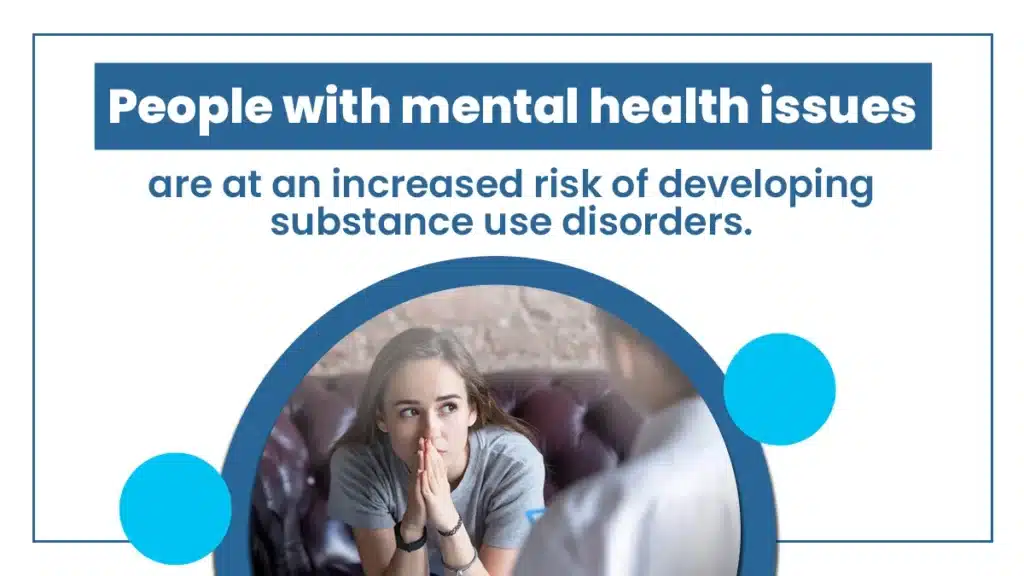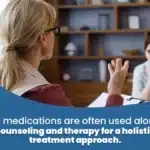Mental health and addiction are closely intertwined and can greatly impact individuals worldwide.
Addiction can be noticed as a coping mechanism for those facing mental health challenges. Substances like drugs and alcohol can initially offer a sense of escape or relief from mental health conditions like anxiety or depression.

However, this short-lived relief can lead to a vicious cycle of increased mental health problems and worsening addiction. It is important to address both aspects simultaneously to achieve lasting recovery and improved well-being.
Key Takeaways
Mental health and addiction often have a strong connection with each other. Millions of people worldwide are impacted by their network of influence. Here is what you need to know:
- The bond between mental health and addiction is complex, often influencing the other.
- People with mental health issues are at an increased risk of developing substance use disorders.
- Effective treatment for co-occurring mental health and addiction issues is essential for recovery and improved well-being.
The Haven Detox-South Florida is a trusted facility providing comprehensive care for those struggling with mental health and addiction. Contact us at (561) 328-8627 for more information.
Mental Health and Addiction Statistics
According to the World Health Organization (WHO), over 264 million individuals worldwide suffer from depression, while an estimated 31 million individuals grapple with drug use disorders, emphasizing the scale of these problems.
Influence of Mental Health on Addiction
The influence of mental health on addiction is profound and multifaceted. Mental health conditions often co-occur with substance abuse, necessitating a comprehensive approach to treatment.
Role of Depression on Addiction
Depression, a pervasive mental health disorder, frequently intersects with addiction. Many individuals with depression use substances like alcohol or drugs to self-medicate and alleviate their emotional distress. A perilous coping mechanism can lead to substance abuse and addiction.
The relationship between depression and addiction is complex. Depression can both lead to and result from substance abuse. Those already struggling with addiction may experience worsening symptoms of depression, perpetuating a vicious cycle.
Link Between Anxiety and Addiction
Anxiety disorders are another group of mental health conditions closely linked to addiction. The constant, overwhelming fear and unease that characterize anxiety can drive individuals to seek relief through substances. This self-medication can lead to addiction, trapping individuals in a cycle of dependence.
Anxiety also tends to intensify cravings, making it even more challenging for individuals to break free from addiction. Effective treatment strategies must address both the anxiety disorder and the addiction to foster lasting recovery.
Bipolar Disorder and Addiction
Bipolar disorder, characterized by extreme mood swings, is another mental health condition that intertwines with addiction. During manic phases, individuals may engage in reckless and impulsive behaviors, including substance abuse.
Conversely, the depressive phase may lead to self-medication as individuals seek to alleviate their overwhelming feelings of sadness and despair. The intense fluctuations in mood inherent to bipolar disorder can complicate addiction recovery. It demands specialized treatment to address both effectively.
Addiction’s Impact on Mental Health
Addiction’s influence on mental health is substantial. Prolonged substance abuse can lead to the emergence of various mental health conditions.
Mental Health Conditions Fueling Addiction
Not only does mental health influence addiction, but addiction can also profoundly impact mental health. Substance abuse can heighten pre-existing mental health conditions or trigger the onset of new ones. The brain’s chemistry is significantly altered by addiction, which can lead to diverse mental health disorders, such as anxiety and depression.
Addiction can be a catalyst for those with a genetic predisposition to mental health conditions. It pushes the individuals toward a downward spiral of deteriorating mental health.
Addiction and the Onset of Mental Health Conditions
Addiction itself can provoke the emergence of mental health conditions. Prolonged substance abuse disrupts the brain’s neural pathways, potentially leading to psychosis or mood disorders. It highlights the complexity of the mental health-addiction relationship.
Treating Dual Diagnosis
Treating dual diagnosis involves a multifaceted approach. It combines mental health and addiction treatment to address both aspects effectively.
Cognitive Behavioral Therapy
Dual diagnosis treatment often involves cognitive behavioral therapy (CBT), a frequently utilized approach. This therapy helps individuals identify and modify harmful thought patterns and behaviors related to addiction and mental health. By providing valuable coping strategies and emotional regulation techniques, CBT can foster long-term recovery.
Medication-Assisted Treatment
Medication-assisted treatment (MAT) combines therapy with medications that help reduce cravings and withdrawal symptoms. MAT is particularly effective for individuals struggling with opioid or alcohol addiction while dealing with mental health disorders. This approach stabilizes patients, allowing them to engage more effectively in their recovery.
Support Groups
Support groups provide individuals with dual diagnosis a sense of community and understanding. Sharing experiences and learning from others facing similar challenges can be immensely therapeutic. Support groups offer a comfortable space for individuals to express themselves and receive encouragement on their journey to recovery.
Importance of Treating Dual Diagnosis
Both individuals and healthcare professionals must recognize the complex relationship between mental health and addiction. Ignoring one aspect while focusing solely on the other often leads to ineffective treatment and potential relapse. People can regain control over their lives by holistically addressing both issues and finding lasting recovery.
The linkage between mental health and addiction is undeniable, each profoundly influencing the other. The importance of treating dual diagnosis cannot be overstated. It is a path to healing, recovery, and hope for those struggling with this complex issue.
Frequently Asked Questions (FAQ)
How are mental health and addiction related?
Mental health and addiction are closely related, impacting adults and children alike. A mental illness or mental disorder can increase the risk of substance use disorder, often termed drug addiction or drug abuse.
According to the National Institute of Mental Health, those with serious mental illness are more vulnerable. The brain can be affected in both short-term and long-term ways.
Seeking mental health and addiction services is crucial to addressing these issues. Try to break the stigma and provide self-help options for those needing assistance.
What is the difference between mental health and addiction?
Mental health and addiction differ in scope and focus. Mental health addresses a broad spectrum of mental health issues, while addiction pertains specifically to substance use disorders.
Research shows that young people, especially teens, are at increased risk, often dealing with co-occurring disorders. Mental health services offer care for various conditions, including the misuse of prescription medications or recreational drugs.
The Haven Detox-South Florida: Supporting Wellness
The Haven Detox-South Florida provides a multidisciplinary approach to identifying the complicated relationship between mental health and addiction.
Our detox programs prioritize safety and comfort during the withdrawal process. Patients in our residential care facilities experience structured routines and peer support in a nurturing environment. We also employ the SMART recovery program, fostering self-reliance and equipping clients with practical, sustainable recovery skills. Wait no longer. Contact us at (561) 328-8627, and let us help you embrace sobriety.






